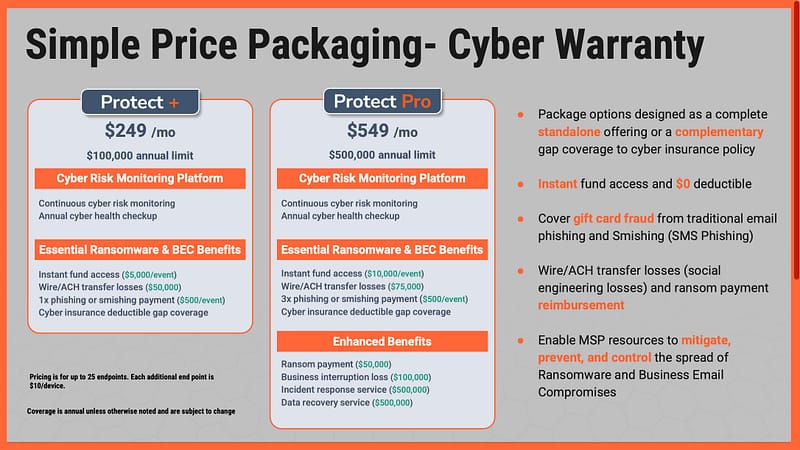In the current digital landscape, the escalation of sophisticated cyber threats compels businesses to various defenses, notably cyber warranties and cyber insurance. Both offer financial post-breach financial recovery but cater to distinct needs.
What is Cyber Warranty?
A cyber warranty is essentially a commitment from a vendor to cover specific costs for customers if a security breach occurs because of a flaw in their offering. Such costs include investigation and remediation expenses.
This protection is dependent on certain conditions being met, such as the customer using the product as directed and maintaining proper security measures.
A cyber warranty is like a traditional warranty. Let’s say, like an appliance warranty. You purchased the washing machine not being aware that there are defects that do exist. A warranty is something that tells you, “there is something not right, let’s get this right and make it whole.”
Cyber warranty is a multi-layered approach. It isn’t just about one product, one service, and that’s all.
Importance of cyber warranty
This assurance signals to customers that the vendor prioritizes security, regularly updates, and patches their offerings. It also distinguishes the vendor in a competitive market, building trust with potential customers.
Two forms of cyber warranty:
1) The first form is that a vendor ensures that their product or service is secured against cyber threats. Should a breach occur because of a flaw in the vendor’s product, the vendor must cover investigation, notification, and recovery costs.
This approach guarantees customers of the provider’s commitment to security through consistent software updates and patches. It gives providers the advantage of standing out among competitors and solidifying customer trust.
2) The second form is that the vendor guarantees that the proper controls are in place and proper practices are observed. If the warranty holder shows that the required five controls were active at the breach’s time, the vendor must fund the recovery expenses from the cyberattack.
Key features of cyber warranty
- Warranties often have a far simpler process, which requires agreeing to the product or service terms and conditions;
- Warranties are limited to first-party incidents only;
- Warranties fall under consumer-protection laws.
How does a cyber warranty work?
A cyber warranty works by enabling the vendor to give assurance to customers that they will cover costs related to security breaches. These costs include investigation, notification, and data recovery, provided certain conditions are met. This solidifies someone’s reputation as a reliable vendor.
Warranty providers usually use an “inside-out” approach. Here, they install tools that would allow it to see what cyber security measures are in place. It does not need the employment of lengthy questionnaires. With the use of tools and a specialized points mechanism, it could determine the degree of warranty it would provide.
Cyber Insurance vs. Cyber Warranty
Consider this analogy: Cyber insurance is like car insurance, compensating for financial losses after an accident. Cyber warranties, conversely, are akin to a car’s check engine light, signaling potential issues to address before they lead to bigger problems, aiming to prevent incidents before they occur.
As to coverage: cyber insurance typically offers a broader range of protection, including data breaches and cyber-attacks, while warranties cover a limited set of risks, including a security flaw in their offering;
As to claims coverage: cyber insurance typically covers the claims from both the policyholder (first-party) and the third party (someone other than the policyholder); warranties are limited to first-party incidents only;
As to customization: insurance policies can be customized with optional covers, whereas warranties are generally more standardized;
As to application procedure, cyber insurance involves a comprehensive application to evaluate risks thoroughly, while cyber warranties involve a simpler procedure, mainly accepting the terms and conditions of the product or service.
At the end of the day, both cyber insurance and cyber warranty’s goal is to give financial protection to the customer.
Types of Cyber Warranty Services
The market offers a diverse range of cyber warranty services, each designed to deliver varying coverage levels and safeguard against cyber threats. Several common ones include:
Should cyber insurance and cyber warranty be paired together?
Yes. Cyber warranty complements cyber insurance. That’s why pairing cyber insurance and cyber warranty can fix the cyber security challenges of SMBs.
First, cyber insurance costs are becoming more expensive, and the process of obtaining is becoming more complex and taking more time.
Second, even if you qualify for cyber insurance, the payout takes weeks or months during a cyber attack. With a cyber warranty, you get the payout within hours or days and the application process is simpler and quicker to make.















